 ATSA Test Prep- Practice ATSA Tests That Mirror the Actual Exam [2025]
ATSA Test Prep- Practice ATSA Tests That Mirror the Actual Exam [2025]
Trusted by over 11,400 ATSA Candidates
New! Updated 2025 ATSA Test Practice
The Air Traffic Skills Assessment (ATSA) is a pre-employment Air Traffic Controller test, administered by the Federal Aviation Administration (FAA). Given the highly demanding nature of the ATSA test and the vast competition when applying for an Air Traffic Control (ATC) opening, thorough preparation is highly recommended to rank among the top candidates and ultimately secure a Tentative Offer Letter (TOL).
The JobTestPrep ATSA Test Prep is fine-tuned to closely mimic each and every part of the FAA ATC Test, and enhance the skills needed to succeed in it.
It includes the following ATSA practice tests:
- ATSA Memory Games Practice- improve the ability to mentally hold and update numbers and equations, with an unlimited number of questions in the exact ATSA test format.
- ATSA Spatial/Visual Relationship Practice- practice quickly recognizing the relation between two presented airplanes.
- ATC Collision Avoidance Simulation Practice- prevent aircraft collision while simultaneously tackling challenging math drills, by practicing infinite scenarios in the same format as the ATSA, and more difficult simulations that make the actual test feel much easier.
- ATSA Logical Reasoning & Reading Comprehension Mock Tests- practice accurately answering questions on time in two of the most challenging tests in terms of time pressure.
- Full-Length Personality Test
Practice Tests for All ATSA 7 Subtests
- Accurate ATC Simulation Radar Game
- Memory Game 1 - Differences
- Memory Game 2 - Variables
- Spatial/Visual Relationship Simulation
- Logical Reasoning practice tests
- Reading Comprehension practice tests
- Full Personality Test & Report
- Extra practice and study guides - math drills, logical reasoning, & more.
Trusted by Thousands of Test-Takers: ATSA Test Prep (2025 Edition)
- 2025 Spring OTS Hiring Bid* is now open for application until March 17, 2025
- Enhanced CTI Program bid* is now open for application until February 26, 2026**
* You must score Well Qualified in the ATSA to advance.
** This bid is open for Enhanced Collegiate Training Initiative (E-CTI) program graduates only or E-CTI students within 12 months of graduation.
What Is the ATSA Test?
The Air Traffic Skills Assessment (ATSA) or Air Traffic Controller test, is a 3.5-hour exam you have to pass after applying to become an Air Traffic Controller in the Federal Aviation Administration (FAA). The ATSA test assesses memory, attention, spatial awareness, logic, and related cognitive skills required to be an excellent Air Traffic Controller (ATC).
The Air Traffic Skills Assessment is conducted at Pearson Professional Centers (PPCs) across the country at the scheduled time and date of your choice within the FAA's testing window. You will be notified of potential dates for the ATC exam in an email invitation (typically sent 2-3 months after application).
*Applying to become anAir Traffic Controller in Australia/Canada? Skip to the Airservices Australia ATC test, or go to the Canadian FEAST Air Traffic Test.
ATSA Practice Test - All ATSA Test Questions
Below is an overview of the ATSA test questions you can expect in the Air Traffic Skills Assessment. To help you visualize what the test looks like, we've provided examples and air traffic control test tips taken from our ATSA Preparation Course (ATSA Test Prep).
ATSA Memory Game 1 - Numbers and Differences
This ATSA aptitude test begins with a number (1-9) appearing onscreen for two seconds. Another number quickly follows. Using the number pad, you need to type in the difference between these two numbers. After you type in your answer, a third number will appear. Now, you'll have to determine the difference between the last number shown on the screen and this new number shown.
Here is a sample from our memory ATSA practice test, closely similar to the actual test:
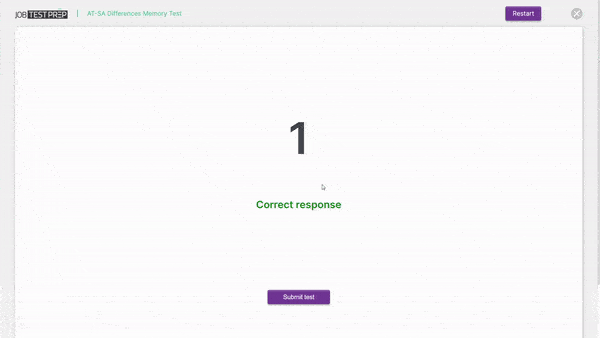
*Source - JobTestPrep's ATSA Test Prep- ATSA Practice Test - Memory
For each answer typed in, immediate feedback is provided. Additionally, a full report with the success rate score appears at the end, so you can track how well you improve.
💡 A main challenge of this air traffic control test is remaining concentrated throughout its high pace. In our full ATSA practice course is an additional ATC memory test without immediate feedback, so that it feels exactly like the actual test.
💡 Another challenge is confusing the last number shown with your last answer, especially since the test keeps running quite quickly. For this reason, try to ignore your answer and mentally repeat the last digit at all times.
ATSA Memory Game 2 - Variables
This aptitude test question consists of three progressively harder sections, each containing 10 questions. The first section flashes multiple letters that each equal a different number (i.e. A=1). Next, you will see on the screen the same letters, albeit this time randomized. Your task is to fill in the number to match the letter.
The second section consists of equations, such as A=B+2, B=1, and therefore A=3. This section uses only addition, subtraction, multiplication, and division. In the third section, you are presented with two variable equations.
Try it for yourself, can you quickly answer what number each variable represents?
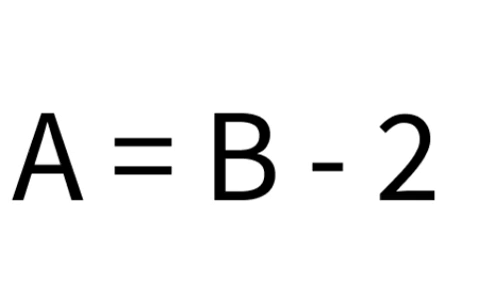
*Source - JobTestPrep's ATSA Practice Test- Memory (from the full ATSA Test Prep)
💡 Tip: Find the best way to remember the numbers appearing and disappearing on the screen. Some test takers like to whisper to themselves the number and letter as they see them. Some use physical methods to remember the variables, like using your fingers or parts of your body.
ATSA Spatial/Visual Relationship Test
On this test, you need to quickly determine the location of two airplanes in relation to each other. You are shown an image with two airplanes, one large and one small airplane, and a text box stating "right" or "left."
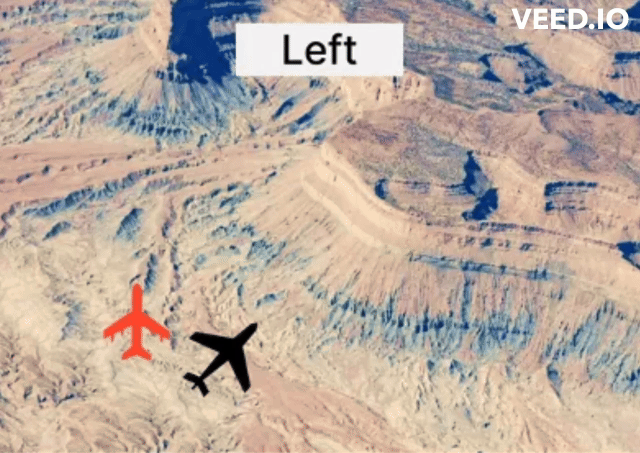
*Source - JobTestPrep's ATSA Practice Test- Spatial Orientation (from the full ATSA Prep Pack)
- First half of the test- you need to imagine you are sitting in the big airplane, and answer yes or no, depending on whether the small airplane is on your right or left.
- Second half of the test- an eye may appear occasionally, meaning you now have to answer the question from the eye's point of view.
💡 When the eye appears, it's usually looking at the big plane, and this point of view causes the reversal of directions from the big plane’s point of view. You can use this trick to answer quickly before you run out of time.
💡 The image will change very quickly- about every 1-2 seconds. To keep up with this pace you have to make sure you are "in the zone" before starting this section, so use the practice test offered at the beginning of this section to warm up. In addition, our ATSA Test Prep includes highly similar ATC practice tests to improve your speed.
ATC Simulation - Collision Avoidance & Math
This Air Traffic Controller Test is an ATC Simulation containing two parts.
- During the first part, the screen displays a map, with numbered balls flying in from off the screen. You must eliminate balls before they are about to collide by typing in the number of one of them.
- In the second part, while avoiding collisions, you are required to simultaneously answer basic math problems.
Here's a sneak peek at the ATSA Interactive ATC Practice test, which contains a random and infinite amount of collision scenarios:
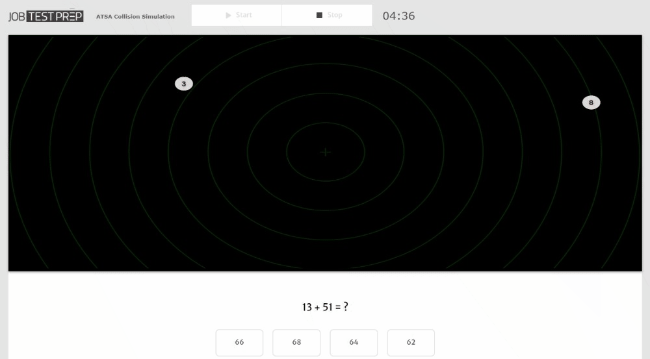
*Source - JobTestPrep ATSA practice test- Collision Simulation (from the full ATSA Prep Pack)
Our ATC radar simulation practice is designed in the same format, with the same keyboard keys and generates a randomized, infinite amount of collision scenarios for practice.
💡 Important Tip: You must prioritize your tasks on the Air Traffic Controller Simulation, like a real ATC Specialist. For example, avoiding collisions is obviously more important than answering a math question. Many candidates state that they got a high score on the ATSA, even when they answered a very small percentage of the math questions.
ATSA Logical Reasoning - Word Problems
This aptitude test contains approximately 18 questions that must be answered in 20 minutes. You will not be able to go back to previous questions and will be penalized for not answering all the questions.
The majority of questions on this test are "seating arrangements", in which you need to sort or arrange a group of people/objects according to given constraints. These tend to be very challenging, especially since you only have a short time to solve them, and no pen and paper.
Try it for yourself:
ATSA Sample Question - Logical Reasoning
For a two-day career event at a local high-school class, exactly six out of eight parents with different occupations - florist, gardener, historian, inventor, jeweler, locksmith, mailman, and optician - are chosen to introduce their occupations to the class. On each day exactly three different parents will speak to the class in three different time slots - morning, mid-day and afternoon, subject to the following conditions:
- The florist can only speak on day 2.
- The gardener and the locksmith cannot speak in mid-day.
- If the gardener speaks on day 1, then the optician and the jeweler speak on day 2.
- The inventor and the mailman will not speak on the same day.
- If both the inventor and the locksmith are speaking, then the inventor speaks sometime before the locksmith.
Which one of the following could be a complete and accurate schedule of the two-day careers event (in order of appearance)?
💡 The two most effective solving techniques when dealing with sitting arrangements:
- Picturing a seating arrangement and filling it according to the rules.
- Eliminating answer choices according to the rules.
Sometimes, using both techniques together is helpful or even necessary.
ATSA Personality Test
This subtest has 108 questions, it is untimed and should take about 15-20 minutes to complete. You are given a list of three statements, and you must determine which of the three is most like you and which is least like you.
The FFA's personality test is very similar in format and structure to the Occupational Personality Questionnaire, though the two are not identical.
Here is a sample from our complete personality study guide:
A Sample of the ATC Personality Practice Test
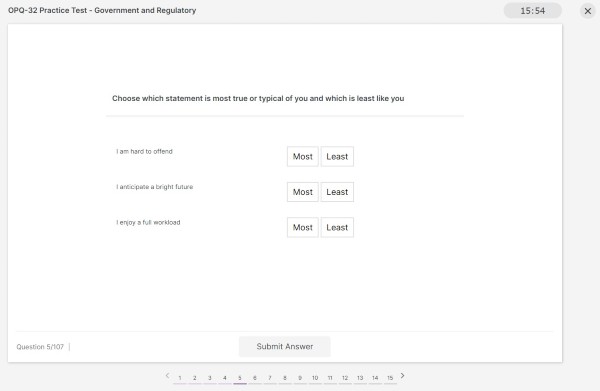
Reading Comprehension
This aptitude test contains 18 questions that must be answered in 20 minutes. You are presented with six paragraphs, each followed by three questions. Questions may ask you to determine the paragraph's main point or which statement is true. Try it for yourself (the explanation will show when you choose the correct answer):
ATSA Sample Question- Reading Comprehension
Experts agree that arts and culture are an important part of the economy, but the precise relationship is complicated. The main question is does investment in the arts stimulate growth, or are the arts the product of economic development? It would seem that the case for continued arts funding is clear-cut—enjoying the arts (visiting art galleries and theatres) boosts the economy. Yet some argue that the link between arts investment and economic output is tenuous. Researchers today are exploring a different angle of this relationship. They are trying to understand how the subjective value of the arts—the 'happiness factor'—may translate into economic benefits. According to the “happiness factor” hypothesis, when a place develops a critical mass of arts and vibrancy it tends to attract talented people which, in turn, tends to raise income.
Which of the following assumptions can definitely be made based on the above paragraph?
The Ultimate ATSA Test Practice
Gain immediate access to our online ATC practice tests, covering all 7 sections of the Air Traffic Skills test. With our Complete Practice Pack, 75% of candidates have achieved the highest possible score. Start early to maximize your chances of success.
Simulations & Practice Tests with full answer reports, explanations, and guides for each section:
- Accurate ATC Simulation Radar Game
- Memory Game 1 - Differences (Gamified)
- Memory Game 2 - Variables
- Spatial/Visual Relationship tests
- Logical Reasoning practice tests
- Reading Comprehension practice tests
- a Full Personality practice test
10/09/23
Recommend for all test takers!
⭐⭐⭐⭐⭐
Samuel K.
09/19/23
IT REALLY HELPS!!
The test prep is similar to the actual exam. It also helps you prepare by telling you which part of the exam you need help with so you know your strengths and weaknesses. If you’re looking for professional test prep that’s going to help your test scores this is the one to choose.
⭐⭐⭐⭐⭐
JCD
09/17/23
Air Traffic Controller Test Practice (ATSA)
I do not write reviews for anything, but this is one I need to express! This prep site is the absolute best, I cannot express it enough! I received Best Qualified because going to the actual test seemed like I'd done it a thousand times before!
⭐⭐⭐⭐⭐
Josiah C.
What is the Pass Rate for Air Traffic Controllers?
The Air Traffic Skills Assessment is a crucial step toward becoming an air traffic controller for the FAA and the competition is very high. Only an estimated 2.5-6% of the candidates pass the ATC test and receive a TOL. Based on a survey conducted among 135 ATSA test takers, practicing with our ATSA Test Prep improved candidates' chances to pass the ATSA exam and receive a TOL by approximately 45%.
What ATSA Score Do You Need?
Since the FAA selects ATC candidates with the highest ATSA scores, simply a passing score on the Air Traffic Skills Assessment is not enough. ATSA test results are divided into 4 score groups:
- Best Qualified (90% or above)
- Well Qualified (85-89%)
- Qualified (70-84%)
- Not Referred (below 70%)
the FAA sends TOLs only to ATC candidates with the highest scores, with a slightly higher preference for pool 1 candidates (military veterans/ CTI graduates). The best way to ensure that you pass the ATSA exam, receive a TOL and advance to the next stage in the ATC hiring process, is to receive a Best Qualified Score.
Why Prepare for the ATC Test?
We can see that repeated ATC test practice tailored to ATSA test questions can significantly improve your Air Traffic Controller test result over practice. For example, practicing ATSA practice tests for the Logical Reasoning section, which is considered one of the most difficult exam parts by many ATSA test takers, was shown to improve candidates' scores by 53%.

*Average score improvement between over 4 logical reasoning simulations (1,108 ATSA Test Prep customers)
Furthermore, candidates also experienced the actual ATSA test as easier and managed to answer more questions in the allotted time.
How to Study for the ATC Test? 5 Tips
- Start preparing a long enough time before the ATSA test date. Most ATC candidates who practice with our preparation take at least a month to prepare, and most wish they had more time.
- Many questions on the ATSA test are unique and will not be found in any other test. To best prepare for it, it is highly recommended to practice full-length ATSA practice tests.
- Since the ATSA result depends on how well you do on all test sections, it is highly recommended to first go over all test sections and identify the parts that are most difficult for you and can be most improved.
- Even If you finish all the practice tests on a specific subject, repeated practice is extremely beneficial for ATC candidates in improving speed and accuracy.
- When completing ATSA practice tests, it's best not to use pen and paper to get the same experience as the ATSA test.
On the ATSA test day, you are allowed a total of 30 minutes of break time throughout the Air Traffic Control test. We recommend planning your breaks before the test, leaving room for adjustments at the time of the test, depending on mental fatigue.
Air Traffic Skills Assessment FAQ
Every year the FAA publishes new opening for the air traffic control trainee position that are open to all US citizens under 30. The announcement can be found on https://www.usajobs.gov/.
With no preparation at all, the Air Traffic Skills Assessment can be very difficult. You may think that because the ATSA is an aptitude assessment, you don't need to practice for it, but this can't be farther from the truth.
Before your upcoming test, get as much information as you can about the test and try to practice using ATSA practice tests that are most similar to the actual test (computerized and similar in their format and difficulty level).
The ATSA test is exactly 2 hours and 49 minutes long, plus 30 minutes of break time, which can also be divided into smaller breaks.
The ATSA test scores are divided into 4 groups – Best Qualified, Well Qualified, Qualified, or Not Referred. Your goal is to score high on this challenging test and get a Best Qualified score, optimizing your chances of getting a TOL.
It can take about a month after the ATSA test to get a referral status (either “Referred” or “Not Referred”). After that, if you scored high enough you can get a TOL (Tentative Offer Letter) about 3 months after taking the test. If your score is not quite good, you are put on a waiting list.
In short, yes. Pool 1 candidates are looked at first, meaning they may get referred and eventually hired, even though they scored lower on the ATC test. That means that if you’re an OTS candidate (Off the Streets), it’s better you score very high on the ATSA.
You can take the AT SA exam as many times as you want, but only once per application period.
It's important to remember that your ATSA test results are valid for three years after taking the test. However, if you feel you can do better on it, you can reapply when the next announcement publishes and take the test again. It is even recommended, especially if you did not get a "Best Qualified" score.
If you cannot make it to your Air Traffic Skills Assessment appointment, you're required to reschedule or cancel it at least 48 hours before the scheduled test date.
The Air Traffic Control (ATC) simulation is one subtest of the ATSA test. It is a game of collision avoidance and basic math questions. You are shown a screen with numbered dots coming in from all angles and your job is to prevent the dots from colliding. When you identify which dots are going to collide, you can press the number of one of the dots, making it disappear, thus preventing the collision.
The ATC simulation test involves different difficulty levels, while in the end the speed of the dots is very high, and you must answer math questions while trying to avoid the collisions. It is considered one of the most difficult parts of the Air Traffic Skills Assessment.
The Air Traffic Controller test does not cost anything for the applicant. However, you should consider travel costs, as sometimes you will need to drive a long way to get to the closest assessment center. The FAA does not reimburse travel costs.
Yes*, the ATSA test is usually done at Pearson Professional Centers (PPCs)** around the country. To find the closest Pearson testing center, write your address here.
Sometimes testing centers get full, so you want to schedule the test soon after getting the exam invitation email. And make sure you choose a date that fits best. In some cases, you will need to drive a few hours or even fly to the nearest testing center, so take that into consideration.
*In 2020, the AT SA exam was conducted in the candidates' homes, because of Covid-19 restrictions.
**In the past, the aptitude test was taken in PSI centers.
Pearson VUE is the official vendor of the Federal Aviation Administration (FAA) for the ATSA test and operates its testing system. If your application on USAJobs goes through, you will get an email from Pearson VUE inviting you to schedule a test date to take the ATSA test.
For more official information about Pearson VUE and Pearson Professional Centers (PPCs), visit this link.
In the past, pool 2 candidates were required to complete and pass the BioQ biographical assessment. Since July 2018 and following a lawsuit about the validity of the assessment, the biographical assessment is no longer relevant for any pool candidates.
Air Traffic Controller Test- Australia
Similar to the FAA ATC hiring process, Candidates who wish to become Air Traffic Controllers in Australia must undergo a lengthy application process involving an Air Traffic Controller test. In AirServices Australia, testing is divided into several stages:
- The first stage is online psychometric tests that assess the following abilities: reading comprehension, numerical reasoning, numerical calculations, error checking, and spatial reasoning.
- In the second stage, you are given a supervised online test called the "interrupt test", which is extremely similar to the Collision simulation practice offered in our ATSA preparation pack. In this Air Traffic Controller Test, you are required to split your attention between two tasks and act to avoid airplane collisions.
- After passing the interrupt test (sometimes before), you can expect an invitation for a short, automated video interview.
- The next stage involves attending an assessment center- either face-to-face or a virtual one (conducted via MS). During the assessment day, you are required to complete the same aptitude and Air Traffic control tests again (to confirm your skills), in addition to a group exercise and a behavioral interview.
Gain online access to our ATC test prep for an exclusive interrupt test practice (collision simulation), and sharpen the most critical skills for passing the online tests:



